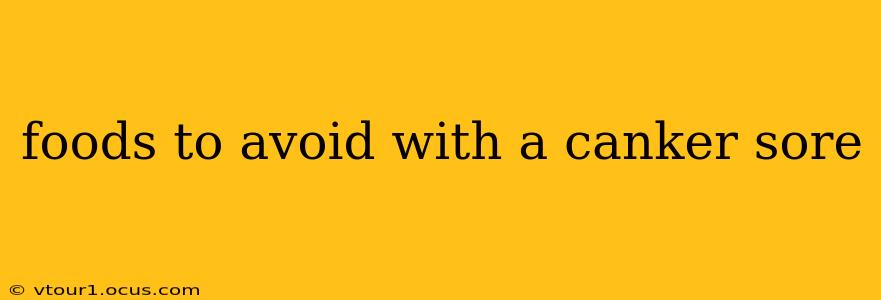Canker sores, those pesky little ulcers that appear inside your mouth, can be incredibly painful and disruptive. While they usually heal on their own within a week or two, certain foods can aggravate them, prolonging the discomfort and hindering the healing process. This guide delves into the foods you should avoid when battling a canker sore, offering tips and alternatives to help you manage your symptoms effectively.
What are Canker Sores?
Before we dive into the foods to avoid, let's briefly understand what canker sores are. Also known as aphthous ulcers, they are small, shallow lesions that develop on the soft tissues inside the mouth. Their exact cause is unknown, but contributing factors include stress, hormonal changes, minor injuries to the mouth, and even certain food sensitivities.
Foods to Avoid with a Canker Sore: The Culprits
Certain foods, due to their texture, acidity, or spiciness, can irritate the delicate tissues of a canker sore, causing burning sensations and delaying healing. Here's a breakdown of the main offenders:
Acidic Foods:
- Citrus fruits: Oranges, lemons, limes, grapefruits, and their juices are highly acidic and can significantly worsen the pain of a canker sore. The acidity can irritate the inflamed tissue and delay healing.
- Tomatoes: Although technically a fruit, tomatoes possess a high acidic content that can be problematic for canker sores.
- Vinegar: This includes vinegar in salad dressings, marinades, and other applications. Its acidity can sting and exacerbate the sore.
Spicy Foods:
- Chili peppers: The capsaicin in chili peppers is known to cause a burning sensation, which is clearly undesirable when you already have a painful canker sore.
- Spicy sauces: Hot sauces and other spicy condiments should be avoided to prevent further irritation.
- Curry powders: Certain curry blends can contain ingredients that exacerbate the pain of a canker sore.
Salty and Crunchy Foods:
- Salty snacks: Chips, pretzels, and other salty snacks can cause further irritation due to their salt content and often rough texture.
- Crunchy foods: Anything that requires significant chewing – crackers, nuts, etc. – can cause friction and further damage the delicate canker sore.
Highly Processed Foods:
- Processed meats: These often contain high levels of sodium and preservatives, which can trigger inflammation and worsen canker sores.
- Sugary foods and drinks: Excessive sugar consumption can weaken the immune system, potentially hindering the healing process of canker sores.
What to Eat Instead: Canker Sore-Friendly Foods
While avoiding the above foods is crucial, nourishing your body with the right foods can promote healing. Opt for soft, bland foods that are gentle on the affected area. Examples include:
- Soft fruits: Bananas, well-cooked applesauce, or mashed avocado
- Smoothies: Blend nutrient-rich fruits and vegetables for easy consumption.
- Yogurt: Plain yogurt is a great source of probiotics, which can improve gut health and potentially aid in healing.
- Oatmeal: This soft food is easy on the mouth and provides essential nutrients.
- Mashed potatoes: A classic comfort food that’s gentle and easily digestible.
H2: Does stress affect canker sores?
Yes, stress is a well-documented trigger for canker sores. When you're stressed, your immune system can be compromised, making you more susceptible to developing canker sores. Stress management techniques, such as meditation, yoga, or deep breathing exercises, can help reduce the frequency and severity of outbreaks.
H2: What home remedies can help with canker sores?
Several home remedies can help soothe canker sore pain and promote healing. These include rinsing your mouth with warm salt water, applying a topical anesthetic like Orajel, and avoiding acidic or spicy foods. However, consult a doctor if your canker sores are severe, persistent, or unusually large.
H2: Can I prevent canker sores?
While there's no foolproof way to prevent canker sores entirely, maintaining good oral hygiene, managing stress, and avoiding known triggers can significantly reduce the frequency and severity of outbreaks. A healthy diet, rich in vitamins and minerals, also contributes to a stronger immune system, thus reducing susceptibility to canker sores.
H2: When should I see a doctor about a canker sore?
Consult your doctor if your canker sores:
- Are exceptionally painful or large.
- Persist for more than two weeks.
- Recur frequently.
- Are accompanied by fever or other symptoms of illness.
By understanding the foods to avoid with a canker sore and incorporating the tips mentioned above, you can manage your symptoms effectively and promote faster healing. Remember that a healthy diet and lifestyle play a crucial role in preventing future outbreaks.
